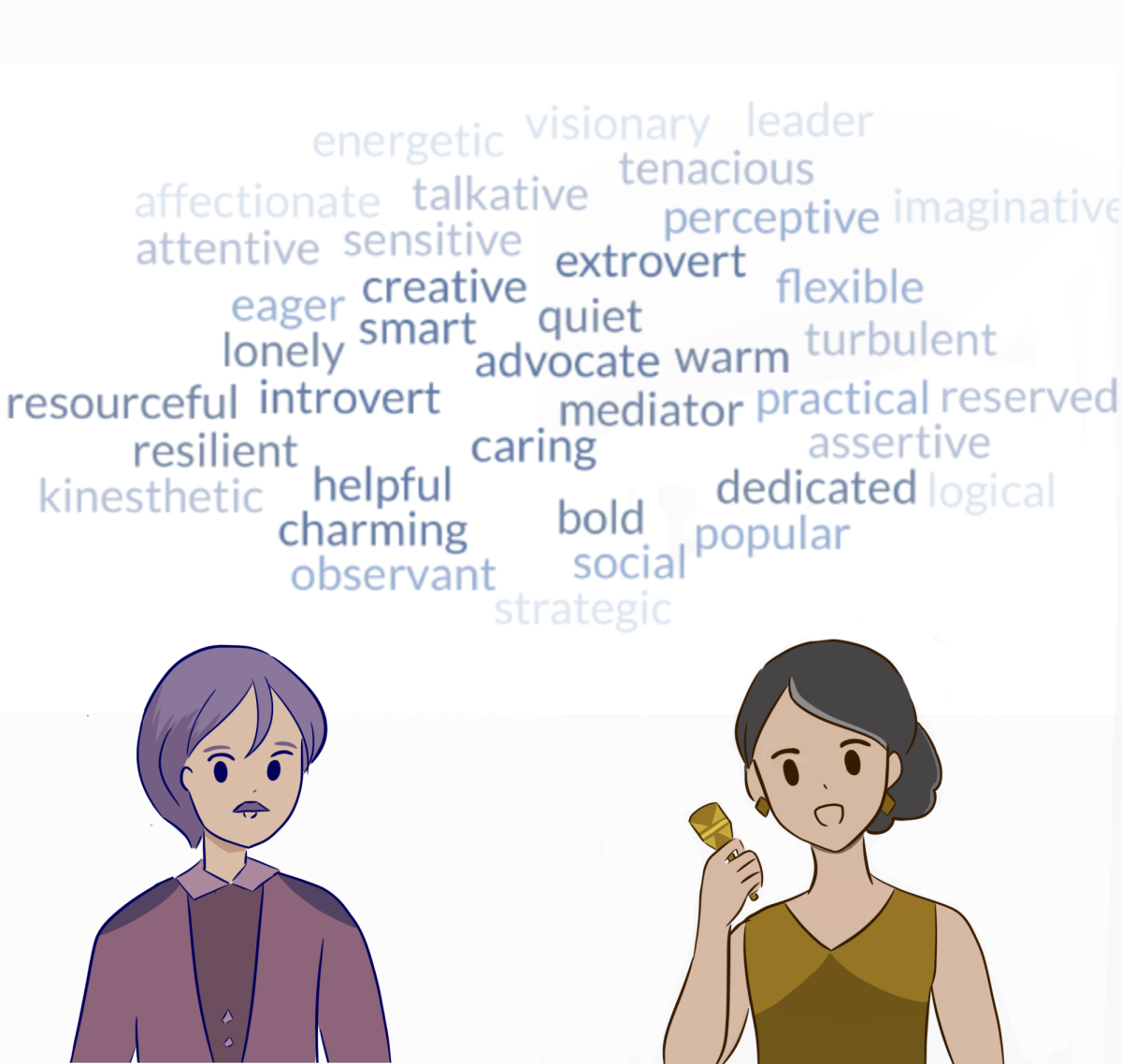A brightly-colored page sits in front of me, promising guidance on the path towards understanding my personality in less than 20 minutes. After finishing the quiz, my personality type emerges on the screen, accompanied by a geometric, pop-art-esque character. I read the description that accurately aligns with my perception of my personality, shocked that an online test seems to know me so well.
Personality tests like The Myers-Briggs Type Indicator (MBTI) often make test takers feel validated and seen through the descriptions of their type. This sense of affirmation is not always a positive influence. When I first took the MBTI test and discovered the similarities between myself and my personality type, my infatuation with the simple categorization led me to grow reliant on my label. The type can be especially harmful and detrimental if taken at face value because the test is based in pseudoscience.
The MBTI is one of the world’s most popular personality tests, with around 50 million test takers. It sorts you into one of 16 personality types using a four letter code: extroversion (E) or introversion (I), intuition (N) or sensing (S), feeling (F) or thinking (T) and judging (J) or perceiving (P).
Mother-daughter duo Katherine Briggs and Isabel Myers, the creators of the system, had no formal education in psychology when making their test. Although they studied the typology systems of Swiss psychiatrist Carl Jung, they lacked the experience to implement his ideas into a reliable typology test because they did not attend any psychology institution.
According to 16Personalities, the most popular MBTI testing site, my type is ENFP, and based on the descriptions of the personality on the website, the categorization is spot-on. So if the test is not based on psychology, why did my designated type seem so accurate with my personality?
My naivety at the time I first took the test led me to believe that because this one description felt true to me, the test must be accurate. At first, I let the label define me, reducing my originality to a stereotype. Instead of trying to grow my character authentically, I tried to copy the personality description as much as possible because it felt like a concrete categorization of my identity, something I could hold on to. After more thorough exploration, though, I discovered the flaws in the system.
If I look at the description for ISTJ, the type that has supposedly opposite qualities to mine, I theoretically shouldn’t identify with the page. However, many of the points still apply to me. Just because I am emotional doesn’t mean I can’t be insensitive sometimes, and just because I’m forgetful doesn’t mean I’m not responsible. The same goes for every other type listed on the website.
“Consul personalities can become very defensive and hurt if someone, especially a person close to them, criticizes their habits, beliefs or traditions.”
“Logicians take pride in their knowledge and in sharing their ideas.”
“Opinions are opinions and facts are facts, and Logisticians are unlikely to respect people who disagree with those facts, or especially those who remain willfully ignorant of them.”
The reason why these statements might feel like they all apply to me is because of the Barnum Effect, which Encyclopedia Britannica describes as when people believe that generalized descriptions are personalized specifically for them. This phenomenon is especially successful when used with positive statements instead of critical negative statements. Almost every single page on the 16Personalities website is filled to the brim with these superficial observations. Although there are enough unique points in each description to distinguish the stereotypical personality types, the majority of them are Barnum statements.
My personal favorite is “Advocates aren’t exactly like everyone else – and that’s a wonderful thing.” The website presents these meaningless statements as some sort of deep, philosophical, life-changing information. 16Personalities is only one MBTI website, but others implement the same effect.
A little bit of pseudoscience may not seem that harmful on the surface — after all, most people don’t really believe a majority of online personality quizzes. At the end of the day, they’re just harmless fun. Yet because the MBTI is marketed as real science, its impact is stronger than the typical Buzzfeed quiz. I grew attached to the box I placed myself into, making it difficult to let go of the personality label.
MBTI has also extended beyond the casual setting. Workplaces are now using this test to identify which candidates would be best to hire or which employees should be grouped together for projects. A person’s livelihood can depend on a personality type which may not even present accurate information.
The MBTI test can turn a person’s personality into an algorithmic category, the model of efficiency and certainty that many of us crave. Nevertheless, the black-and-whiteness that comes with this systematic thinking can lead to a fixed mindset towards growth. If I kept believing that my entire personality laid in a singular four-letter code, I may have never been able to reach beyond my shallow categorization.
Upon reflection, while my type does describe some parts of me, it misses so much more. I might have many of the traits that the typical ENFP has, but my personality is much less one-dimensional and more complete. After all, four letters can only reveal so much about someone, a cursory and inadequate view that fails to tell the full story.


















![“[Building nerf blasters] became this outlet of creativity for me that hasn't been matched by anything else. The process [of] making a build complete to your desire is such a painstakingly difficult process, but I've had to learn from [the skills needed from] soldering to proper painting. There's so many different options for everything, if you think about it, it exists. The best part is [that] if it doesn't exist, you can build it yourself," Ishaan Parate said.](https://harkeraquila.com/wp-content/uploads/2022/08/DSC_8149-900x604.jpg)




![“When I came into high school, I was ready to be a follower. But DECA was a game changer for me. It helped me overcome my fear of public speaking, and it's played such a major role in who I've become today. To be able to successfully lead a chapter of 150 students, an officer team and be one of the upperclassmen I once really admired is something I'm [really] proud of,” Anvitha Tummala ('21) said.](https://harkeraquila.com/wp-content/uploads/2021/07/Screen-Shot-2021-07-25-at-9.50.05-AM-900x594.png)







![“I think getting up in the morning and having a sense of purpose [is exciting]. I think without a certain amount of drive, life is kind of obsolete and mundane, and I think having that every single day is what makes each day unique and kind of makes life exciting,” Neymika Jain (12) said.](https://harkeraquila.com/wp-content/uploads/2017/06/Screen-Shot-2017-06-03-at-4.54.16-PM.png)








![“My slogan is ‘slow feet, don’t eat, and I’m hungry.’ You need to run fast to get where you are–you aren't going to get those championships if you aren't fast,” Angel Cervantes (12) said. “I want to do well in school on my tests and in track and win championships for my team. I live by that, [and] I can do that anywhere: in the classroom or on the field.”](https://harkeraquila.com/wp-content/uploads/2018/06/DSC5146-900x601.jpg)
![“[Volleyball has] taught me how to fall correctly, and another thing it taught is that you don’t have to be the best at something to be good at it. If you just hit the ball in a smart way, then it still scores points and you’re good at it. You could be a background player and still make a much bigger impact on the team than you would think,” Anya Gert (’20) said.](https://harkeraquila.com/wp-content/uploads/2020/06/AnnaGert_JinTuan_HoHPhotoEdited-600x900.jpeg)

![“I'm not nearly there yet, but [my confidence has] definitely been getting better since I was pretty shy and timid coming into Harker my freshman year. I know that there's a lot of people that are really confident in what they do, and I really admire them. Everyone's so driven and that has really pushed me to kind of try to find my own place in high school and be more confident,” Alyssa Huang (’20) said.](https://harkeraquila.com/wp-content/uploads/2020/06/AlyssaHuang_EmilyChen_HoHPhoto-900x749.jpeg)





